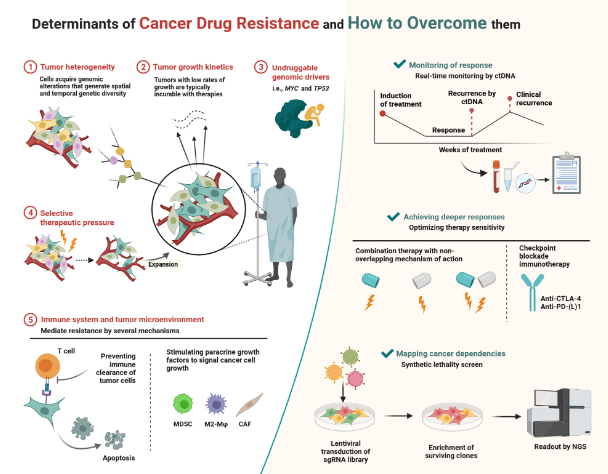Nowadays, several treatment options can be proposed to a patient diagnosed with cancer. These treatments can, in some cases, eradicate tumors in patients whose cancer has already metastasized. However, for many, treatments stop working. This is known as drug resistance, where cancer cells end up resisting the effects of drugs used for treatment.

Cevatemre, B. (2020). Overcoming Drug Resistance in Cancer. https://app.biorender.com/biorender-templates/figures/all/t-5f17551d2baea000aee86925-overcoming-drug-resistance-in-cancer
Cancer cells can be resistant before the treatment even starts, making them insensitive to a specific drug. This intrinsic resistance is often due to the presence of specific genetic mutations. We can quote the example of mutations in the TP53 gene, which has a role in apoptosis. This can cause cancer cells to survive the cell death that chemotherapy is supposed to induce, causing the treatment to fail. In such case, these resisting cells can proliferate and thus reform tumors.
Acquired resistance, on the other hand, develops over time (within weeks or years after starting the treatment) as cancer cells adapt to the drug while it is being administered. However, there is a catch. Despite the progression of the disease under the ongoing therapy, the use of higher drug doses is limited by the toxicity of tissues, therefore limiting the amount of drug that actually reaches the tumor.
According to Bissan Al-Lazikani (Nature Biotechnology), "co-administer drugs that work by different molecular mechanisms [would be] thereby increasing tumor cell killing while reducing the likelihood of drug resistance and minimizing overlapping toxicity".
Another approach is to re-sensitize patients to the original treatment by treating them with a drug blocking the mechanism of resistance developed by these tumors, before shifting back to the drug to which they grew resistant.
Some researchers decided to see cancer resistance as an “engineering problem” (Vasan and al., 2019), synthesizing different approaches for each tumor and use it in order to direct the choice of a suitable therapy for each specific case.
Several points however need to be explored and understood, such as the tumors’ regulation mechanisms (epigenetic and metabolic-wise).
In conclusion, drug resistance in cancer represents a burden in the effective management of the disease, causing the patient’s quality of life to diminish as the cancer grows more difficult to treat. Understanding the mechanisms causing drug resistance in cancerous cells is therefore needed in order to develop strategies to counteract it and offer an effective treatment to patients.